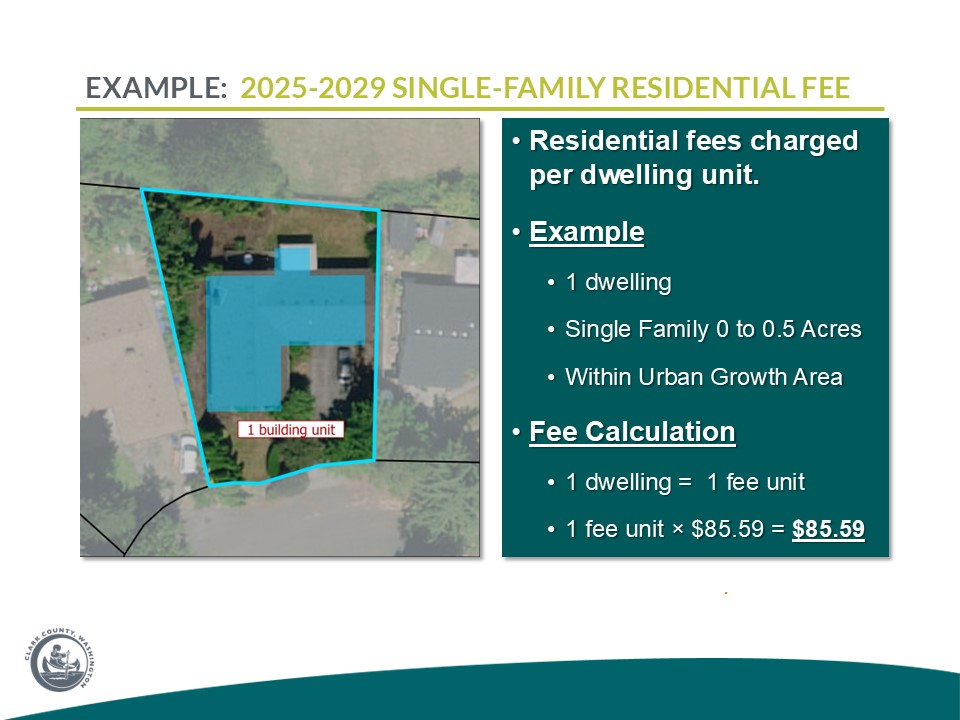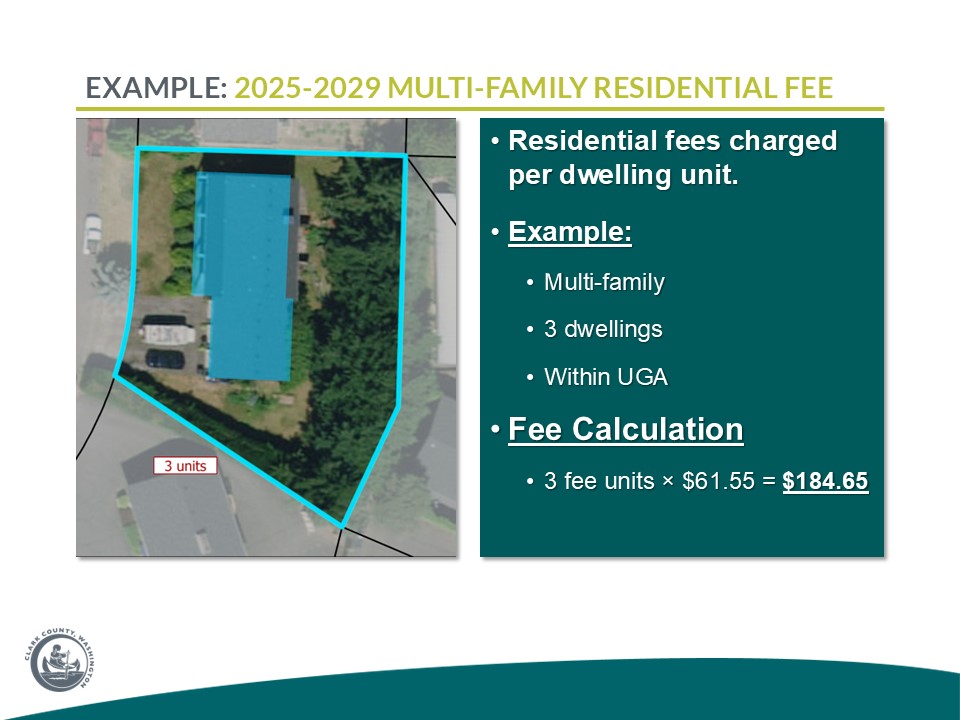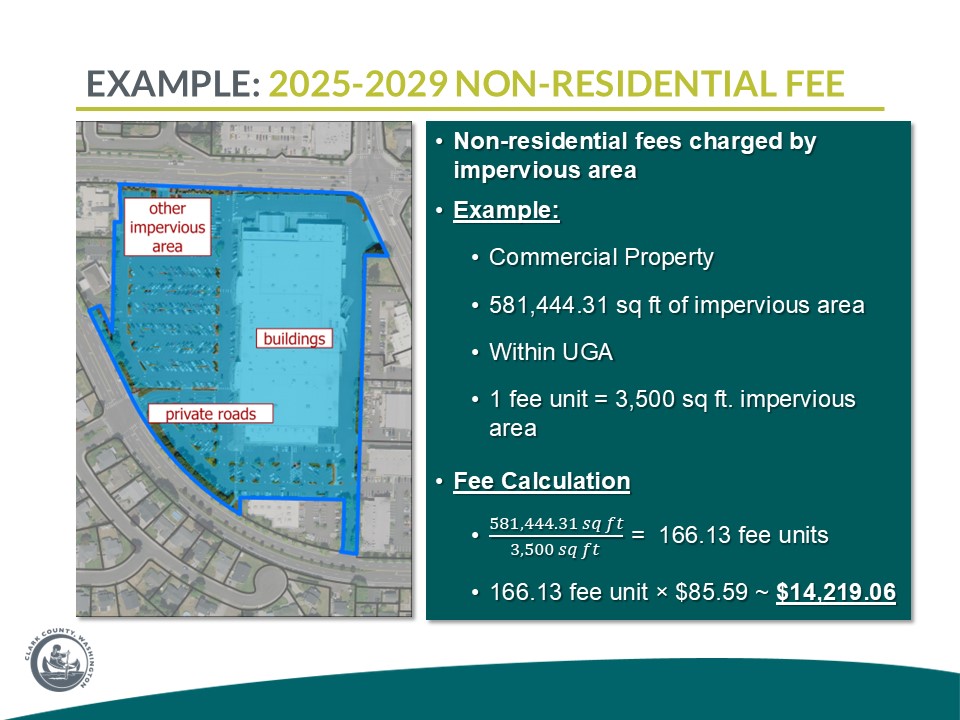Clean Water Fee
The Clean Water division is responsible for protecting and restoring water quality in streams, rivers and lakes throughout Clark County. To do this, we manage stormwater, which is the water that runs off of streets, parking lots, and buildings when it rains. Stormwater runoff is the number one way that pollution enters local waterways. To manage stormwater runoff, the Clean Water division builds, operates, and maintains public drainage infrastructure to prevent flooding on roads and to remove harmful pollution before it enters rivers and lakes. We also collect water quality data, provide education and outreach opportunities for schools and residents, and offer technical assistance to businesses and homeowners associations on how to take care of privately owned stormwater facilities to prevent pollution.
New Clean Water services
Starting on Aug. 1, 2024, Clark County has a new Phase I NPDES Municipal Stormwater Permit, which requires the county to implement various projects and programs to protect and restore water quality. To comply with new federal and state permit requirements, Clean Water updated the services our team will provide. These additional and expanded services are supported by the Clean Water Program fee.
Contact
Email us at cleanwater@clark.wa.gov or call us and leave a voicemail at 564.397.4345 and press 2.
Definitions
The per unit cost for stormwater management in the unincorporated area. This rate is determined considering the costs to implement stormwater management services over five years.
Residential properties are charged a stormwater rate for each dwelling unit (home, apartment, condo, etc.). For non-residential properties, Clark County uses an equivalent rate unit, which is established by calculating the average impervious surface area for a single-family residential lot in the urban growth area: 3,500 square feet. Final impervious surface quantities are determined in GIS. To establish the final number of fee units each property is charged, the total square footage of impervious surface is divided by 3,500 square feet. For example, if a property has 35,000 square feet of impervious surfaces, they have 10 fee units.
Calculation, using GIS, of the total fee assessed to a parcel of land. The fee takes into account the land use designation, location (within or outside the urban growth area), the applicable stormwater rate and the number of fee units.
Stormwater is water that runs off of impervious surfaces (roads, roofs, concrete surfaces, gravel, packed dirt, saturated ground, etc.) and enters storm drains. Storm drains typically drain to rivers and streams. Stormwater collects pollutants, sediment and debris as it runs off surfaces and into storm drains. Storm drains drain into local rivers, streams and lakes.
GIS stands for “geographic information system”. In Clark County, this includes land records and associated data maintained by the County’s Geographic Information Services department.
Areas of Clark County that are not within a city’s boundaries. You can also enter your address in the Property Information Center website (https://gis.clark.wa.gov/gishome/property/index.cfm), on the “Account” tab, look under “Jurisdiction” under the “Administrative Data” heading. If Clark County is listed, that property is located in unincorporated Clark County. If a city’s name is listed, the property is in the incorporated area for that city.
Areas designated as urban growth areas through the state-required comprehensive planning process. "Urban growth areas" means those areas designated by a county pursuant to RCW 36.70A.110 (RCW stands for “Revised Code of Washington”, which is Washington state law). In short, urban growth areas are those “…within which urban growth shall be encouraged and outside of which growth can occur only if it is not urban in nature,” (RCW 36.70A.110). In Clark County, the largest unincorporated urban growth area is the Vancouver urban growth area. To see if a property is within an urban growth area, enter the address in the Property Information Center website ((https://gis.clark.wa.gov/gishome/property/index.cfm). On the “Account” tab, look at “Urban Growth Area” in the “Land Use Planning” section under the “Administrative Data” heading. If “County” is listed, the property is not located in an urban growth area. Maps of incorporated areas, unincorporated areas, and urban growth areas can be found at https://gis.clark.wa.gov/gishome/mapstore/#/mapProducts.
Frequently Asked Questions
The fee pays for services and infrastructure to manage and treat stormwater. Clean Water Program fees are included in annual property tax statements. A property’s total fee amount is calculated using the stormwater rates found in the table in Clark County Code 13.30A.050.
The Clean Water division is responsible for meeting federal and state laws and regulations meant to protect and restore water quality in streams, rivers and lakes throughout Clark County. To do this, we manage stormwater, which is the water that runs off of streets, parking lots, and buildings when it rains. Stormwater runoff is the number one way that pollution enters local waterways.
Our federal and state stormwater permits have increasing requirements for services and infrastructure to treat stormwater and reduce pollution. The Clean Water Program fee funds those services and infrastructure. The Clean Water Program fee also ensures that the infrastructure draining water from roadways is maintained and functional, increasing safety of roads for the traveling public. In addition, we collect water quality data, provide education and outreach opportunities for schools and residents, and offer pollution prevention assistance to businesses and homeowners associations on how to take care of privately owned stormwater facilities.
RCW 36.89.080 (Revised Code of Washington, i.e., state law) allows county legislative authorities (councils) to pass local laws to charge for stormwater services. In Clark County, county code Chapter 13.30A provides the authority for assessment and collection of the Clean Water Program fee in the unincorporated area.
Clark County’s new stormwater rates are less than other local jurisdictions including the cities of Washougal, Vancouver, Camas, Battle Ground, Longview, Ridgefield and La Center. Clark County’s updated stormwater rates are also the lowest in Western Washington.

The monies collected through the Clean Water program fee fund:
- Inspection, operation and maintenance of stormwater infrastructure including thousands of individual assets
- Services and infrastructure mandated by state and federal permits and required for compliance with the Clean Water Act
- Services and infrastructure that protect water quality and reduce pollution, including reforestation projects, education and outreach programs, and more
The Clean Water Program fees are collected in a separate fund that is not part of the County General Fund. The Clean Water fund is only used for stormwater related services provided by Clean Water.
The Clean Water Program fee is charged to owners of developed property within the unincorporated area, including owners of tax-exempt properties. Properties without impervious, or hard, surfaces are not charged a fee. The Clean Water Program fee is charged differently for single-family residential properties, multi-family residential properties, and non-residential properties. Property owners only pay the Clean Water Program fee if their property is in the unincorporated area of Clark County. Property owners within incorporated cities are charged a different stormwater utility fee by the city they live in.
No, the fee is not optional.
Everyone in the community benefits from cleaner water and well-drained streets achieved through public stormwater infrastructure. The activities of each person living and working in Clark County affects the health of our community’s lakes, rivers and streams. Funding from the Clean Water Program fee pays for important services that protect water quality and watershed health.
The Clark County Council voted to implement the fee in 2000.
The rate was last increased in 2015. In 2024, the Clark County Council approved an increase after a public process which included information sessions, digital and in-person outreach, community surveys, public meetings and council hearings. Staff recommend the rate increase to council to cover the costs associated with meeting increasing federal and state stormwater permit requirements. Council held a public hearing on Nov. 12, 2024, and voted to adopt rates as detailed in Clark County Code 13.30A.050. These rates fully cover the costs of Clean Water division services. The fee is scheduled to be reviewed every five years, when the next stormwater permit will be issued. The next review is scheduled for 2029.
The fee amount is determined based on a property’s location (inside or outside the urban growth area and the property type (residential or non-residential).
The fee is calculated based on units. For residential properties one residential dwelling equals one unit. The fee rate is $85.59 per unit inside the urban growth area, and $63.74 outside the urban growth area. Single-family residential large lots are charged reduced stormwater rates: as the size of the lot increases, the rate decreases.

Multifamily residential lots are based on the number of residential dwellings located on the lot: $61.55 per dwelling inside the urban growth area, and $39.70 per dwelling outside the urban growth area. Multifamily rates are lower than single-family residential rates because these properties are more densely developed. More densely developed properties produce less stormwater than if the same amount of people were housed in less densely developed properties.

Non-residential properties are charged based on the amount of impervious, or hard, surfaces which contribute to stormwater runoff. One fee unit is equal to 3,500 square feet of impervious surfaces. Each non-residential property is charged $85.59 per unit inside the urban growth area, and $63.74 outside the urban growth area. For example, if a non-residential property in the urban growth areas has 35,000 square feet of impervious surface, the amount owed for the Clean Water Program fee would be $855.90 ($85.59 per unit x 10 fee units).

Currently, the fee calculation does not include discounts for permeable pavers, disconnected downspouts and other ways properties can reduce or treat stormwater from their property.
The current stormwater rate structure adopted by the Clark County Council on Nov. 12, 2024, can be found in Clark County Code 13.30A.050.
Staff consider the financial health of the Clean Water Fund, changing stormwater permit requirements, and changing costs associated with maintaining infrastructure and meeting regulatory requirements. Using that information, staff make a recommendation to the council for updated stormwater rates that will cover the cost of services. The Clean Water division conducts outreach to the community about their recommendations and asks for input about Clean Water services. The council reviews the recommendations and receives public comment during a public hearing. The council then votes to approve or not approve an increase.
Property owners in the urban growth area pay higher fees because there are more impervious, hard surfaces in the urban growth area. The fee covers the cost of design, construction, inspection, and maintenance of stormwater facilities, and for enforcement activities. Stormwater management needs are greater in urban growth areas.
Go to the Property Information Center website and enter your address or parcel number. Click on the “Taxes” tab and select “Tax Statements”. Open the first statement on the list and find the line-item charge for the Clean Water Program. This represents the annual Clean Water Program fee charged to your property. Navigate back to the “Taxes” tab to view the total tax statement amount billed and paid in the current and previous years.
Clean Water fees are included within your property tax statement. Fees of more than $50 can be paid in two installments. Eligible seniors and persons with disabilities may qualify for fee reductions. For more information about property tax bill payments and payment options for the Clean Water Program fee, visit the Clark County Treasurer’s website. To make a payment by phone, please call 1.833.440.8685.
Property owners who would like to request a review of Clean Water Program fee amount owed for their property can submit a request for review via email to cleanwater@clark.wa.gov. Property owners may also call us and leave a voicemail at 564.397.4345 and press 2. The request will be forwarded to the appropriate staff who will review the request and communicate with the requester directly and share detailed information about how the Clean Water Program fee for their property was calculated.
There are relief and deferral programs available for property owners with limited income, and for seniors and persons with disabilities. There are other tax reduction programs available, as well. Information about these programs is available at clark.wa.gov/assessor/property-tax-relief-programs. Those programs are managed by the Assessor’s Office. For information or questions about those programs, applications, approvals and denials, please contact the Assessor’s Office.
Additionally, bills over $50 can be paid in two installments: one due in April and one due in October. If a full payment can’t be made, partial payments are applied to the oldest balance unless otherwise instructed (statutory interest and/or penalties apply). There are interest and penalty waivers offered for income-qualified individuals facing tax foreclosure or distraint. Information is available at clark.wa.gov/treasurer/tax-relief. Those processes are managed by the Treasurer’s Office. For information or questions about those programs, please contact the Treasurer’s Office at 564.397.2252.
Delinquent Clean Water Program fee payments are subject to interest and penalties at the same rate as property tax delinquencies.
Public Involvement
Community Listening Sessions – Stormwater Rate Study
The Clean Water division hosted three Community Listening Sessions to hear what Clean Water services are most important to residents and ratepayers of Clark County. Our team was seeking public feedback on the draft stormwater rates we are proposing to Clark County Council for adoption.
We want to thank everyone who joined us in person and virtually on Sept. 11, Sept. 16 and Sept. 19. Slides shown during the listening session and other materials are below.
Listening Session Materials
Listening Session Recording: https://www.youtube.com/watch?v=0LMDxhDPDo0
Presentation (PDF)
Mandated Services (PDF)
Recommended Services (PDF)
Additional Services (PDF)
How we compare (PDF)
Maintaining Public Stormwater Infrastructure (PDF)
Monitoring Water Quality (PDF)
Stormwater Asset Inventory (PDF)
Thomas East Wetland Photo Timeline (PDF)
Frequently Asked Questions (PDF)
Maps
